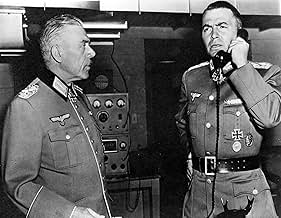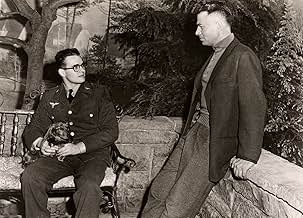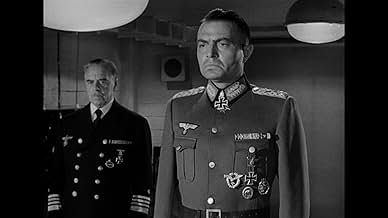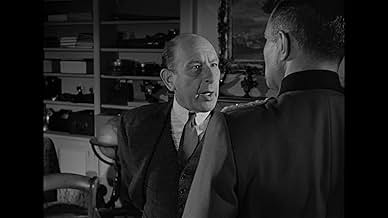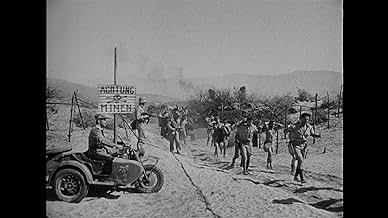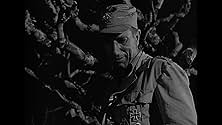VALUTAZIONE IMDb
6,9/10
7021
LA TUA VALUTAZIONE
Aggiungi una trama nella tua linguaThe story of the final years of the respected World War II German general, Erwin Rommel.The story of the final years of the respected World War II German general, Erwin Rommel.The story of the final years of the respected World War II German general, Erwin Rommel.
- Regia
- Sceneggiatura
- Star
- Premi
- 1 vittoria in totale
Philip Ahlm
- German Soldier & Chauffeur
- (non citato nei titoli originali)
John Alderson
- German Sergeant
- (non citato nei titoli originali)
- …
Jack Baston
- Gen. Alfred Jodl
- (non citato nei titoli originali)
Robert Bohannon
- Minor Role
- (non citato nei titoli originali)
Boyd Cabeen
- Minor Role
- (non citato nei titoli originali)
Roland Carpenter
- German Officer
- (non citato nei titoli originali)
Mary Carroll
- Rommel's Maid
- (non citato nei titoli originali)
Steve Carruthers
- Signal Man
- (non citato nei titoli originali)
Recensioni in evidenza
Wonderful performances, first-rate script and direction (moving musical score in key places, as well), plus a well-structured theme about moral dilemmas of patriotic soldiers who realize they're obeying evil orders, make this a little-known gem.
Did Rommel really participate in the plot to kill Hitler? Hitler sure thought so. He had his favorite general poisoned; about that there is no question.
Did Rommel know Hitler before the war? Not sure when they became acquainted but Rommel ran AH's bodyguard unit for a while, then became one of Hitler's favorite generals when he helped sweep the British to Dunkirk in 1940.
Was Rommel aware of and morally responsible for the Holocaust? A recent award winning Rommel biography cites one scene I wish they could have included in this film: Rommel around 1941 advised Hitler that he was concerned by Allied carping on German anti-semitism. "Why don't we put some Jews into prominent leadership positions and shut them up?" Rommel suggested. Hitler told Rommel to stick to military matters and, after the general exited the room, told associates: "That fellow has absolutely no understanding of what we are trying to accomplish."
The movie does generally succeed in portraying the theme of a soldier so single-mindedly focused on the professional technique of his job that he only slowly awakens to the moral horror and self-destructiveness of the leader he serves.
The Churchill quote used at the film's ending is meant to address (and answer) the questions about whether it is morally proper to make a film that glorifies a Nazi general. If Churchill could say such magnanimous things about him...and it's an accurate quote...then so could Hollywood.
(Interesting historical note: British film audiences in the early 1950s were not in such a generous mood. The studio quickly churned out the much-inferior "Desert Rats" film, featuring Mason as a more-villainous Rommel, to mollify outraged critics.)
Where did the quote come from that is spoken in this film by von Reunstadt: "Victory has a thousand fathers, but defeat is an orphan"? Yes, JFK used it, famously, after the Bay of Pigs fiasco. Many newsmen of the time mistakenly credited the president with originating it, but JFK didn't claim credit for it. The line has since been traced back to some Italian count in the 1500s. His name was Ciano or something like that. But JFK was a big movie fan and, my guess is, probably learned this aphorism from "The Desert Fox" a decade before using it in his famous post-Bay of Pigs press conference!
Did Rommel really participate in the plot to kill Hitler? Hitler sure thought so. He had his favorite general poisoned; about that there is no question.
Did Rommel know Hitler before the war? Not sure when they became acquainted but Rommel ran AH's bodyguard unit for a while, then became one of Hitler's favorite generals when he helped sweep the British to Dunkirk in 1940.
Was Rommel aware of and morally responsible for the Holocaust? A recent award winning Rommel biography cites one scene I wish they could have included in this film: Rommel around 1941 advised Hitler that he was concerned by Allied carping on German anti-semitism. "Why don't we put some Jews into prominent leadership positions and shut them up?" Rommel suggested. Hitler told Rommel to stick to military matters and, after the general exited the room, told associates: "That fellow has absolutely no understanding of what we are trying to accomplish."
The movie does generally succeed in portraying the theme of a soldier so single-mindedly focused on the professional technique of his job that he only slowly awakens to the moral horror and self-destructiveness of the leader he serves.
The Churchill quote used at the film's ending is meant to address (and answer) the questions about whether it is morally proper to make a film that glorifies a Nazi general. If Churchill could say such magnanimous things about him...and it's an accurate quote...then so could Hollywood.
(Interesting historical note: British film audiences in the early 1950s were not in such a generous mood. The studio quickly churned out the much-inferior "Desert Rats" film, featuring Mason as a more-villainous Rommel, to mollify outraged critics.)
Where did the quote come from that is spoken in this film by von Reunstadt: "Victory has a thousand fathers, but defeat is an orphan"? Yes, JFK used it, famously, after the Bay of Pigs fiasco. Many newsmen of the time mistakenly credited the president with originating it, but JFK didn't claim credit for it. The line has since been traced back to some Italian count in the 1500s. His name was Ciano or something like that. But JFK was a big movie fan and, my guess is, probably learned this aphorism from "The Desert Fox" a decade before using it in his famous post-Bay of Pigs press conference!
This is a pretty solid attempt to portray a soldier's great dilemma - balancing loyalty to the state and obedience to orders with the higher calling of loyalty to what's right and just. Erwin Rommel was one of the great German generals of World War II (a hero in Germany and respected by the Allies.) In the end, he also became involved with the conspiracy against Hitler. The movie shows us some of that development, beginning with his incredulousness at Hitler's orders that the Afrika Korps stand and fight to the last man in Africa rather than withdrawing to fight another day. According to the movie, it was this "stand and fight to the last man" attitude of Der Fuhrer that finally pushed Rommel over the edge. That makes Rommel consistent with what I know of most of the leaders of the "resistance" (such as it was) to Hitler. The opposition wasn't political; it wasn't based on a rejection of Nazi ideology or distaste for Hitler's racial policies - it tended to be based simply on the belief that Hitler was leading Germany to defeat in the war. That's the overarching sentiment portrayed here. That being the case, Rommel may not have been the sympathetic character this movie makes him out to be - maybe he just had the smarts to realize that Germany was fighting a losing war. There's also no mention of his performance during the German invasion of France in 1940, in which Rommel - as a panzer commander - received some German criticism for both his tactics and his tendency to exaggerate his achievements.
James Mason was very good as Rommel. His portrayal was believable, although I wish there had been more exploration in the story of where Rommel came from rather than simply starting us abruptly in Africa. Made only 6 years after the end of the war, the movie is also somewhat courageous in presenting a German general (even one who was unsympathetic to Hitler) in such a sympathetic light. I didn't find this to be structured particularly well. There was too much narration involved, which seemed put an end to any flow the movie might have been trying to develop. Some scenes (particularly of the Allied landings on D-Day) featured a little too much patriotic American and British and French music as the troops went ashore (frankly, listening to the Marine Fight Song or The Marseillaise in a movie about Rommel seemed a bit silly.)
It's an interesting movie, but doesn't seem to completely capture the man it portrays.
James Mason was very good as Rommel. His portrayal was believable, although I wish there had been more exploration in the story of where Rommel came from rather than simply starting us abruptly in Africa. Made only 6 years after the end of the war, the movie is also somewhat courageous in presenting a German general (even one who was unsympathetic to Hitler) in such a sympathetic light. I didn't find this to be structured particularly well. There was too much narration involved, which seemed put an end to any flow the movie might have been trying to develop. Some scenes (particularly of the Allied landings on D-Day) featured a little too much patriotic American and British and French music as the troops went ashore (frankly, listening to the Marine Fight Song or The Marseillaise in a movie about Rommel seemed a bit silly.)
It's an interesting movie, but doesn't seem to completely capture the man it portrays.
For meritorious service above and beyond the call of duty to his country, Rommel was advised in the end to 'off' himself. No trial necessary, as he was guilty until proved innocent, and why waste everyone's time. But, of course, he was working for the original 'wild and crazy guy'.
"The Desert Fox" is an excellent biopic and is an idealized version of Rommel's military career, particularly as it pertains to Germany's WW II Afrika Corps. It is one of James Mason's best pictures, right behind "Odd Man Out" and slightly ahead of "A Star Is Born". It is a sympathetic portrayal of a man torn between loyalty and love of country, and perhaps a man a little slow on the uptake regarding current internal military affairs. Supporting acting was in very capable hands and there was chemistry evident between Mason and his wife, played by Jessica Tandy. Good script, good direction - hard to find a flaw in this one, which played on FMC the other morning.
"The Desert Fox" is an excellent biopic and is an idealized version of Rommel's military career, particularly as it pertains to Germany's WW II Afrika Corps. It is one of James Mason's best pictures, right behind "Odd Man Out" and slightly ahead of "A Star Is Born". It is a sympathetic portrayal of a man torn between loyalty and love of country, and perhaps a man a little slow on the uptake regarding current internal military affairs. Supporting acting was in very capable hands and there was chemistry evident between Mason and his wife, played by Jessica Tandy. Good script, good direction - hard to find a flaw in this one, which played on FMC the other morning.
I cannot count the number of times I've seen this excellent film. It is endlessly watchable. James Mason plays a very believable Rommel (at least he looked the proper age unlike the actor who played him in PATTON). True, this is an idolized portrait of Rommel, whose reputation in history (after all he was Hitler's favorite general, an autocratic and egotistical warrior who served his Furher with skill and zeal) was salvaged because of his final opposition to Hitler, an action that caused his death on Hitler's orders. It would be interesting, as one reviewer wrote, to see a German filmmaker's take on Rommel's life.
The script is tight, giving the cast excellent opportunities to create intelligent and believable characters. To the film's credit, the historical events are generqally presented with fairly good accuracy. As a side note: the voice of British General Desmond Morris (upon whose biography the film is based and who gives a running narration throughout) was dubbed by actor Michael Rennie (THE DAY THE EARTH STOOD STILL), but who is not credited.
Despite flaws that mark all historical movies of any age, but especially biographies, I highly recommend THE DESERT FOX, especially for it's acting.
The script is tight, giving the cast excellent opportunities to create intelligent and believable characters. To the film's credit, the historical events are generqally presented with fairly good accuracy. As a side note: the voice of British General Desmond Morris (upon whose biography the film is based and who gives a running narration throughout) was dubbed by actor Michael Rennie (THE DAY THE EARTH STOOD STILL), but who is not credited.
Despite flaws that mark all historical movies of any age, but especially biographies, I highly recommend THE DESERT FOX, especially for it's acting.
This is a fine biopic of a worthy and honorable opponent serving a despicable cause. Unfortunately, there is not enough North Africa Campaign in the film to satisfy a war film buff. When I first saw it in the theater, it did whet my appetite to learn more about this horrendous and costly war. I have been interested in it since. The acting is first-rate, and, unlike Enemy at the Gate, the British and American accents don't detract from the film, the British accents at any rate. As others have noted in their reviews of this film, Rommel probably wasn't anti-semitic. He deliberately ignored Hitler's orders to round up Jews during the invasion of France. He also never forgave Hitler for abandoning the Afrika Korps to their fate in 1942, not to Hitler's less than energetic attempts to keep the DAK supplied.
Lo sapevi?
- QuizErwin Rommel's widow, Lucie Marie Rommel acted as a technical consultant and adviser to this movie. She was played by Jessica Tandy in the film itself. Mrs. Rommel lent the production some of her husband's personal artifacts and liaised with Nunnally Johnson, the film's producer and screenwriter. As Frau Lucie Maria Rommel, Mrs Rommel later also acted as a military consultant to the film Il giorno più lungo (1962) made by 20th Century-Fox, the same studio that produced this movie.
- BlooperThe opening commando raid shows at least a dozen German soldiers killed. In reality, only four were killed.
- Citazioni
Field Marshal Gerd von Runstedt: [It's] too late for me. I'm seventy now - too old to fight, too old to challenge authority, however evil... but not too old, however, to wish you and your friends the best of luck in their extremely interesting enterprise.
- Curiosità sui creditiThe 20th Century Fox logo appears without the usual fanfare.
- ConnessioniEdited from Desert Victory (1943)
- Colonne sonoreThe Army Air Corps Song
(uncredited)
Music by Robert Crawford
Heard during the scenes of D-Day and the ensuing battles
I più visti
Accedi per valutare e creare un elenco di titoli salvati per ottenere consigli personalizzati
Dettagli
- Tempo di esecuzione
- 1h 28min(88 min)
- Colore
- Proporzioni
- 1.37 : 1
Contribuisci a questa pagina
Suggerisci una modifica o aggiungi i contenuti mancanti


